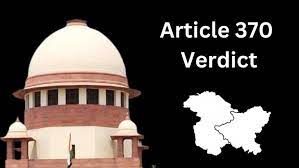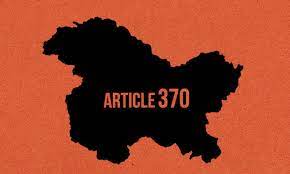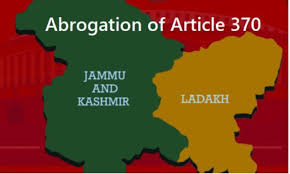The recent Supreme Court verdict on Article 370 has created ripples across the nation, with Jammu and Kashmir at the center of attention. In this article, we delve into the implications of this landmark decision and its far-reaching consequences for the region.
Background of the Supreme Court’s verdict on Article 370
The revocation of Article 370, which granted special status to Jammu and Kashmir, has opened up new possibilities for development and integration. This historic decision by the Supreme Court has been hailed by some as a step towards strengthening national unity and ushering. However, critics argue that this decision may have far-reaching implications for the unique identity of Jammu and Kashmir.
The special status accorded to Jammu and Kashmir under Article 370 has been a contentious issue for years. It granted the region a certain level of autonomy, including separate laws, a separate constitution, and control over internal affairs. However, this autonomy also resulted in a sense of isolation and hindered the region’s integration. The Supreme Court’s verdict, therefore, marks a significant shift in the power dynamics of Jammu and Kashmir.
Key implications of the Supreme Court’s verdict on J&K
The implications of the Supreme Court’s verdict on Article 370 are multifaceted and far-reaching. Let’s delve into some of the key implications that this decision may have for Jammu and Kashmir.
Impact on the political landscape of J&K
The revocation of Article 370 has fundamentally altered the political landscape of Jammu and Kashmir. With the special status gone, the region is now on par with other states of India. This change has sparked debates about the future of regional political parties that had thrived under the previous arrangement. The Supreme Court’s verdict has raised questions about the relevance and viability of these parties in the new political scenario.

Changes in governance and administration in J&K
The revocation of Article 370 has also led to significant changes in the governance and administration of Jammu and Kashmir. The region is now directly governed by the central government. This change has brought a new set of administrators and bureaucrats to the region, tasked with implementing policies. However, this transition has not been without challenges, as the region grapples with the complexities of integrating.
Socio-economic implications for the people of J&K
The Supreme Court’s decision on Article 370 has raised hopes for socio-economic progress in Jammu and Kashmir. The revocation of the special status is seen by many as an opportunity for the region to unlock its true potential and attract investments for development. The central government has already announced several initiatives aimed at promoting industries, generating employment, and improving infrastructure in Jammu and Kashmir. However, the success of these initiatives depends on various factors, including the willingness of investors and the ability of the region to overcome challenges such as infrastructure deficiencies and political instability.
Security and defense considerations post the verdict
The security and defense landscape of Jammu and Kashmir has also witnessed significant changes following the Supreme Court’s verdict. The region has been a hotspot of insurgent activities for decades, and the revocation of Article 370 has raised concerns about the potential escalation of violence. The central government has taken measures to ensure the safety and security of the people, including increasing the presence of security forces and implementing stricter surveillance measures. However, achieving lasting peace and stability in the region remains a complex and challenging task.
Reactions and responses to the Supreme Court’s verdict
The Supreme Court’s verdict on Article 370 has evoked a range of reactions and responses from various stakeholders. While some sections of society have welcomed the decision, considering it a necessary step towards integration and development, others have expressed apprehensions about the potential erosion of the unique identity and cultural heritage of Jammu and Kashmir. Political parties, civil society organizations, and individuals have voiced their opinions, both in support of and against the verdict. These diverse reactions reflect the complex and deeply entrenched nature of the issue at hand.
The way forward for J&K after the verdict
As Jammu and Kashmir moves forward after the Supreme Court’s verdict, it is crucial to chart a path that balances the aspirations of the people with the need for integration and development. The region needs sustainable solutions that address the economic, social, and political challenges it faces. This requires a nuanced approach that takes into account the unique history, culture, and aspirations of the people of Jammu and Kashmir. It also necessitates active participation and engagement of all stakeholders, including the central government, regional political parties, civil society organizations, and the people themselves.

Conclusion: Assessing the long-term implications of the Supreme Court’s decision on Article 370
The Supreme Court’s verdict on Article 370 has undoubtedly set in motion a series of changes and transformations. While it presents opportunities for development and integration, it also raises concerns about the preservation. As the region navigates through this crucial phase, it is imperative to carefully evaluate the long-term implications of the Supreme Court’s decision and work towards a future that upholds the aspirations.
In conclusion, the Supreme Court’s verdict on Article 370 has significant implications for Jammu and Kashmir. The revocation of the special status has opened up new possibilities for development and integration, but it also raises concerns. As the region moves forward, it is essential to strike a balance between the aspirations of the people and the need for progress and stability. Only through comprehensive and inclusive measures can Jammu and Kashmir find a path towards lasting peace and prosperity.



